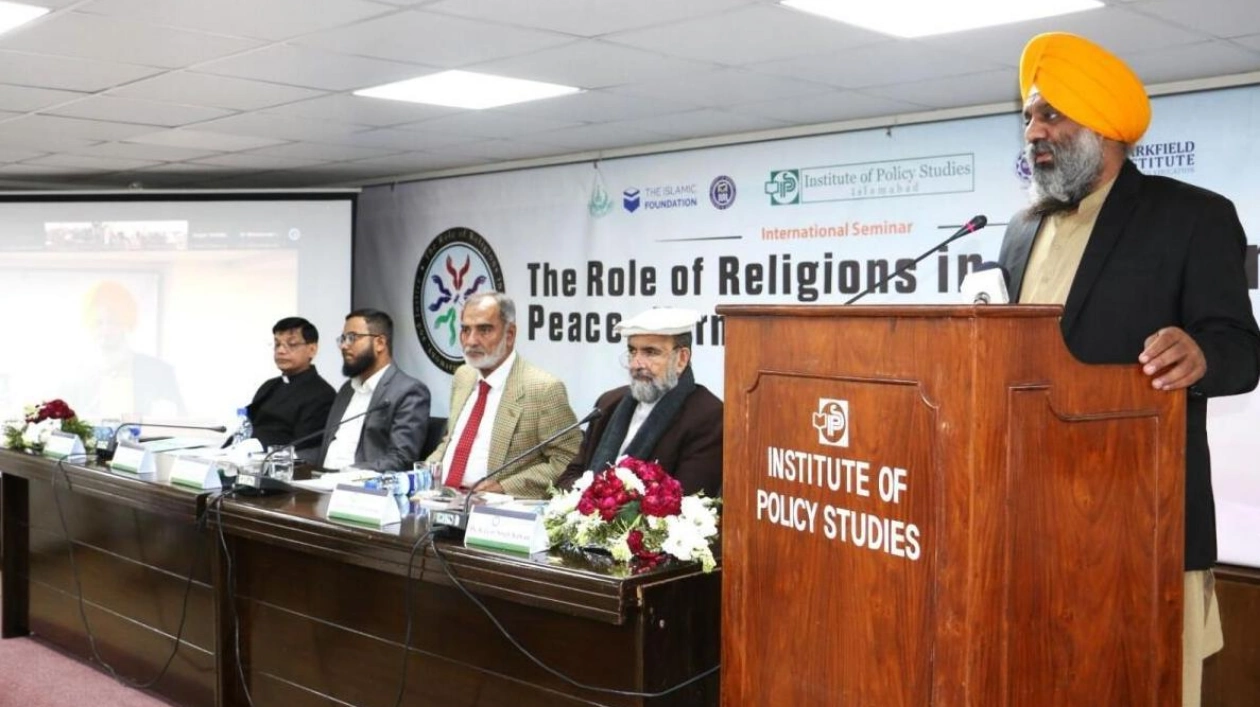Rev Fr Prof Sarfraz Simon, diocesan director of the Catholic Church; Dr Hafiz Waqas Khan from Riphah International University, Islamabad; Khalid Rahman, chairman of the Institute of Policy Studies, Islamabad; Justice Dr Qibla Ayaz, member of the Shariat Appellate Bench, Supreme Court of Pakistan; and Dr Kalyan Singh Kalyan of GC University, Lahore.
In a remarkable and uplifting assembly, scholars and religious leaders from six distinct faiths came together at an international seminar to explore the profound impact of religion in promoting peace, harmony, and justice. The seminar, titled ‘The Role of Religions in Fostering Peace, Harmony, and Justice’ and organized by the Institute of Policy Studies (IPS), Islamabad, united voices from Islam, Christianity, Hinduism, Sikhism, Buddhism, and Judaism. The aim was to delve into how shared ethical values and consciously practiced faith can bridge gaps, dispel misconceptions, and lay the groundwork for global unity. This exceptional event underscored the power of dialogue among followers of different faiths to tackle modern challenges and foster narratives that are inclusive, based on mutual respect and understanding.
The session, chaired by Justice Dr Qibla Ayaz, member of the Shariat Appellate Bench, Supreme Court of Pakistan (SCP), featured addresses by Rev Fr Prof Sarfraz Simon, diocesan director of the Catholic Church, Dr Neelima Shukla-Bhatt of Wellesley College, USA, Dr Kalyan Singh Kalyan of GC University, Lahore, Dr Samantha Ilangakoon of the University of Peradeniya, Sri Lanka, Dr Ophira Gamliel of the University of Glasgow, and Dr Hafiz Waqas Khan of Riphah International University, Islamabad. The speakers noted that the adaptability of religious teachings across various contexts showcases their potential to bridge divides, transforming dialogue into concrete change and offering hope for a future grounded in shared ethical values.
Dr Qibla Ayaz emphasized that inclusiveness is a core tenet of all religions. However, he pointed out that the media’s focus on negative incidents while ignoring positive contributions fuels religious nationalism. He urged religious advocates, policy influencers, and followers of religion to take collective responsibility to bridge gaps, promote unity, and leverage social media to amplify messages of inclusivity.
Dr Hafiz Waqas highlighted Islam’s message of peace, justice, forgiveness, and respect for diversity, noting that the term ‘Islam’ itself means peace. He underscored Islam’s commitment to equality and the message of reconciliation and moral leadership in fostering harmony and justice, as outlined in the Holy Quran and Sunnah.
Prof Simon reflected on Christianity’s ethos of peace, emphasizing that true peace arises from ‘trust in God and harmonious relationships.’ He stressed that freely chosen and consciously practiced faith is vital in preventing religious violence and nurturing a culture of peace.
Dr Neelima underscored Hinduism’s inherent pluralism, rooted in the Rig Vedic principle of ‘welcoming noble ideas from all directions.’ She highlighted ‘religious tolerance’ and ‘acceptance of diversity’ as key Vedic principles for global harmony.
Dr Kalyan, quoting Sikh teachings on self-reflection and generosity, emphasized the need to overcome misunderstandings and misconceptions about other religious teachings.
Dr Ilangakoon shared the Buddhist ethical framework, focusing on refraining from evil, doing good, and purifying the mind, while emphasizing the belief in the egalitarian nature and potential for liberation in all humans.
Dr Gamliel highlighted the Jewish principle from Deuteronomy to ‘pursue justice,’ emphasizing shared heritage and interconnections between religious traditions over millennia.
Khalid Rahman, chairman of the Institute of Policy Studies, Islamabad, emphasized the crucial role of human behavior in shaping religion’s influence, stating that ‘religions are not inherently divisive; their impact depends on how they are practiced and interpreted.’ He highlighted how religion is often misused to incite violence and exclusion, overshadowing its core values of compassion and justice.
Source link: https://www.khaleejtimes.com






